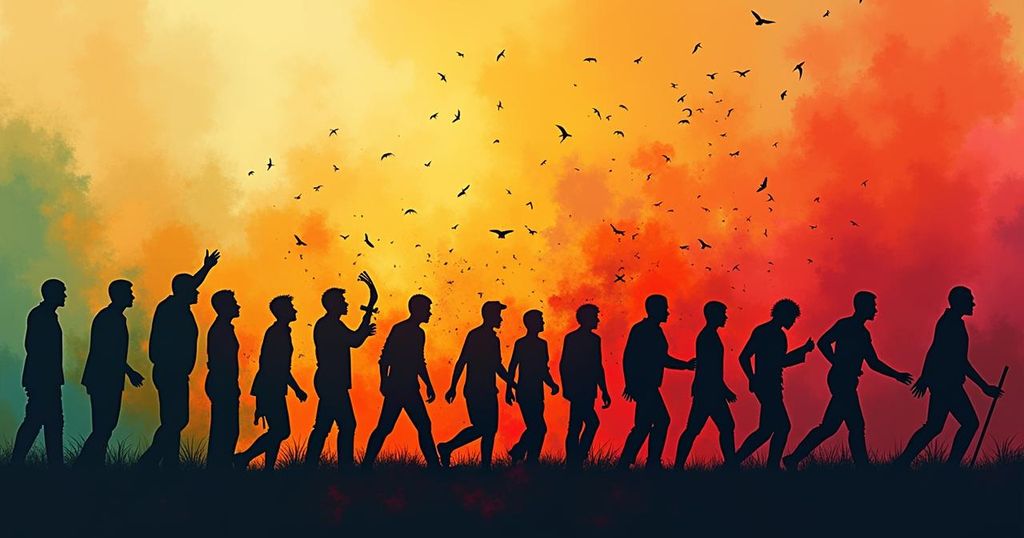Bharat has progressed significantly over the last seventy-seven years, emerging as the fifth largest economy with a youthful demographic. However, it faces modern security challenges that include social engineering and misinformation tactics. The article highlights historical parallels of foreign intervention and the manipulation of civil societies, urging the need for a multipronged strategy to tackle both internal and external threats systematically.
In the last seventy-seven years, Bharat has made significant strides in various sectors amidst numerous challenges both internal and external. As the world’s most populous nation and the seventh largest by area, it boasts a favorable demographic profile, with an average age of 29 years compared to 37 for China and 48 for Japan, as indicated by the World Population Prospects (2024 Revision). Bharat is the fifth largest and fastest growing economy, expected to rise to third place within the next 2-3 years. However, it faces complex security challenges that extend beyond traditional warfare into realms involving social engineering, misinformation, cyberattacks, and advanced technologies such as artificial intelligence. The National Security Advisor of Bharat has highlighted that modern warfare has transitioned from territorial conflicts to influences targeting civil societies. The new warfare tactics encompass various strategies designed to manipulate the populace and foster dissent against the state. It is asserted that the Western countries, particularly the United States, have effectively weaponized civil disobedience to destabilize nations with independent foreign policies. Examples from history illustrate this point, with leaders like Muammar Gaddafi and Saddam Hussein falling victim to interventions justified by false claims of democracy and weapons of mass destruction, respectively. Both leaders were eliminated not solely due to their governance styles but also as a result of their independent policies that threatened Western interests. Today, artificial intelligence and social media are employed to warp public perception against governments, while dissenting views are often branded as authoritarian. This sort of political manipulation has propelled the bourgeoisie to lead movements against their own governments, effectively mirroring tactics seen during the Arab Spring and various protests in Europe, such as the Euromaidan in Ukraine. Closer to home, the situation in Bangladesh, where Sheikh Hasina was ousted following mass protests fueled by misinformation and external meddling, serves as a cautionary tale. This context raises parallels with Bharat, as evidenced by recent statements from political leaders warning of similar repercussions. Rakesh Tikait, a prominent farmer leader, cautioned that the current Indian government could face a fate akin to that of Sheikh Hasina should discontent continue to rise. Moreover, the role played by technological firms, including social media corporations, in influencing political dynamics has become exceedingly troubling. During an inquiry into potential collusion between the Biden administration and tech giants, Mark Zuckerberg disclosed that Facebook had been pressured to limit free speech, particularly amidst the COVID-19 pandemic. Notably, incidents involving interference in electoral processes have raised significant concerns regarding the sovereignty of Bharat’s democratic institutions. Disconcertingly, geopolitical tensions also loom with unstable situations in neighboring regions like Bangladesh and Myanmar. Militancy and proxy wars are escalating, posing grave threats to national security, especially in Bharat’s Northeast. In light of these developments, a multi-faceted approach is imperative. Efforts should prioritize raising awareness about the methods employed by anti-national actors, holding technological companies accountable for their influence on public discourse, enforcing laws governing peaceful protests, expediting justice reforms, and stabilizing regions affected by conflict such as Manipur. Enhanced coordination among intelligence and enforcement agencies is critical to counteract terror financing and drug trafficking threats.
The article examines the evolving landscape of warfare, particularly focusing on Bharat’s challenges in maintaining national security amidst external influences and internal discontent. As a rapidly developing economy with a youthful demographic, Bharat’s progress is intricately linked to geopolitical dynamics and historical precedents of foreign intervention, often masked as efforts to promote democracy. By understanding the socio-political landscape, the article seeks to elucidate the ways in which modern conflicts manifest and calls for strategic actions to bolster resilience against these threats.
In conclusion, amid Bharat’s impressive growth trajectory, the complex challenges it faces require a proactive approach to strengthen national security. Awareness of external influences, accountability of social media platforms, and reforms in law enforcement and judicial processes are essential to safeguard the nation’s integrity. Solidifying public trust and resilience against divisive tactics will be crucial in navigating the nation towards a stable and prosperous Viksit Bharat.
Original Source: organiser.org






